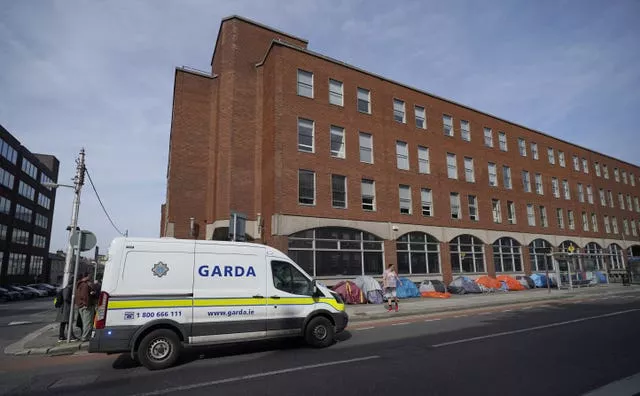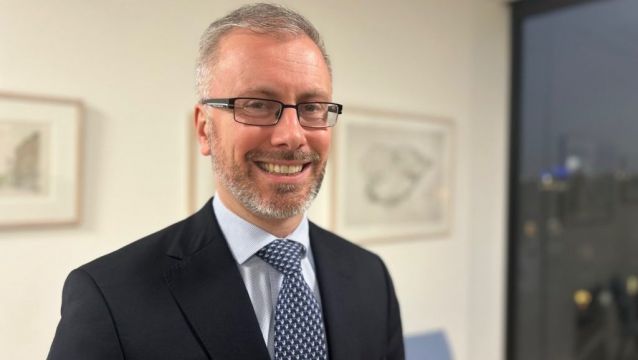An average of 15,000 international protection applicants arriving in Ireland will be the “new normal”, according to Integration Minister Roderic O’Gorman.
In an interview with the PA news agency, the Green Party minister also said his department is working more effectively with gardaí on its response to protests outside accommodation centres.
One of the key commitments secured by the Green Party in the Programme for Government was a pledge to end and replace the much-criticised system of direct provision, which is the name given to the accommodation and other supports provided to asylum seekers.
Mr O’Gorman said he was disappointed this has not been delivered but said “the landscape has entirely changed” since he published the White Paper to End Direct Provision in 2021.

“Major war on the European continent has created a massive humanitarian challenge and one where Ireland has acted very strongly, decisively and been able to provide accommodation for more people than we’ve ever done in a similar circumstance.
“Our department, for a year, had to focus on the immediate challenge there and that has created delays in terms of delivering the White Paper.”
He also said that paper was based on approximately 3,500 people arriving every year but that figure is now between 13,000-15,000.
However, the minister said “a lot” has been achieved in terms of the paper’s goals on integration and support for children and families.
He said: “People can work within six months now, they can get a bank account, they can get a driver’s licence. Those are all basic things but weren’t readily accessible prior to the White Paper.”
Asked about the department’s projections on arrivals in the future, Mr O’Gorman said: “Predictions in this area are always difficult but I suppose we have two years now where the numbers – though dramatically different to what they were pre-Covid – are reasonably in line in terms of 13,000, 15,000.
“So I think going forwards, we have to plan that that is the new normal rather than, you know, 3,500.
“And I think we have to build a system that is ready to accommodate that number while their applications are being processed. We also have to get better and faster at processing the applications.”

He said he believed there should be more State-owned accommodation rather than paying out “very significant amounts of money” to the private sector.
There have been several protests and blockades outside buildings being used as or earmarked for asylum seeker accommodation this year, with some centres being targeted in suspected arson attacks – most recently in Co Galway.
The minister, gardaí and the Government have faced criticism for their handling of such protests.
Mr O’Gorman said he has seen more effective engagement and co-operation with An Garda Síochána about handling the protests after meeting senior management earlier in the year.
“I think it’s important that that co-operation continues and we always have to – as a situation evolves at a particular protest – monitor how we can best handle that.”
He said he was “quite frustrated” with the claim that migration is not discussed in Ireland and also criticised some opposition TDs who had made “entirely inaccurate” claims about immigration during a recent Dáil debate.
Mr O’Gorman said: “I’m very happy to have a discussion about migration in our country, about the huge benefits of migration, about the challenges of migration too – and there are challenges there.
“But it should be on the basis of fact and reality, not on the basis of, you know, kind of: ‘Oh, I saw in a Facebook group, someone said something once and I’m going to repeat it like it’s gospel truth’.”

However, he said there are people who are “committed racists” who are determined to stir up racist sentiment around the country and accurate information would not change their position.
Mr O’Gorman said hate speech and hate crime legislation will be useful for when such people “step beyond a certain mark”.
He said: “We can’t stop people having particular views – that’s not possible. But where, I suppose, through those views, they’re inciting violence and hatred to other people, I think that’s where the State can step in.”
As a politician frequently targeted by far-right abuse, Mr O’Gorman said he has “stepped back” from posting and engaging people on social media himself.
He said his own team has disabled comments on X, formerly Twitter, adding: “There’s no point giving people a platform where they can spout abuse.”
In addition, Mr O’Gorman said he was “very privileged” and “very grateful” to have garda protective services with him due to his position at Cabinet.
In May, the Council of Europe commissioner for human rights wrote to the Irish Government expressing concern after the State failed to provide accommodation to hundreds of international protection applicants.
The Government is again in a position where it has not offered State-provided accommodation to hundreds of new applicants.
Mr O’Gorman said: “We’re here again for a combination of significant numbers of people arriving seeking international protection and the wider pressures we’re facing in terms of the provision of accommodation.
“And look, there’s no doubt incidents like we saw (in Galway) – the destruction of private property like that, violence like that – makes the job harder in terms of securing additional accommodation.”
Elsewhere in his brief, the minister said he is focused on a range of targeted measures for the most vulnerable children, after securing a further universal 25 per cent cut in childcare costs in the latest Budget.
It is a regular refrain from opposition parties that Mr O’Gorman has been “isolated” from his Cabinet colleagues while dealing with immigration issues.
The minister rejected the claims by saying he does not know where that idea comes from and said opposition parties are “always looking for cracks” in Government.
He said: “I work well across Government. So much of the work I do is linked to what happens in other Government departments as well.”
Mr O’Gorman said he could have sought a change of department in the reshuffle in December 2022, but he did not want to as he is committed and passionate about the brief, and added: “I have a lot of things I still want to get done going into 2024.”
The Minister for Children, Equality, Disability, Integration and Youth added: “We’ve a busy department but lots of my colleagues in Government are busy too and lots of people in life have busy jobs as well. I’m really passionate about the stuff that’s in this department.”







